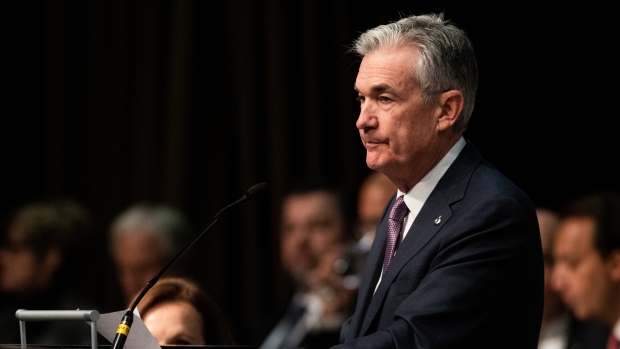Dec 17, 2018
Stocks tumble in broad sell-off as Fed meeting weighs
, Bloomberg News

U.S. equity indexes slid to their lowest close in 14 months as investors weighed the impact of the Federal Reserve on growth in an economy already anxious over trade, geopolitical tensions and a possible government shutdown.
The S&P 500 Index finished Monday’s session at its lowest level since October 2017. The technology, health-care and consumer sectors led the rout, but no segment of the benchmark went unscathed. Insurance stocks plunged after a court ruling jeopardized Obamacare, while Johnson & Johnson sank on fresh worries its asbestos scandal will intensify.
In Canada, the S&P/TSX Composite Index closed down 232.42 points at 14,362.65.
At one point, the Dow Jones Industrial Average dropped more than 600 points. The Russell 2000 Index of smaller companies entered a bear market. The dollar dropped, while Treasuries gained. West Texas crude settled below US$50 for the first time since October 2017 as glut fears grew.
Investors will be scrutinizing the Fed’s statement Wednesday, as well as Jerome Powell’s news conference, for clues as to its intentions for 2019. One market observer has already weighed in: President Donald Trump tweeted Monday that it was “incredible” the central bank was considering a rate hike, given low inflation and a strong dollar.
“The stock market, in particular, is very vulnerable to all of these speculations as to what’s going on, politically what’s going on outside our borders, who’s tweeting what, what the Fed’s going to do on Wednesday,” Terri Spath, chief investment officer at Sierra Mutual Funds, told Bloomberg TV.
Global growth forecasts for next year are being trimmed as a trade war between the biggest economies bites and markets reel from a volatile 2018. Meanwhile, political uncertainty still grips investors. There are yet more personnel changes within the Trump administration and confusion remains over Britain’s future relationship with the European Union.
U.S. Interior Secretary Ryan Zinke will leave at the end of the year amid a swirl of federal investigations. Investors will keep monitoring Brexit developments after Theresa May’s team pushed back against reports they are warming to a second referendum.
Retailers led declines in the Stoxx Europe 600 Index as Asos Plc plunged after warning that its Christmas shopping season got off to a disastrous start.
These are the main moves in markets:
Stocks
The S&P 500 Index fell 2.1 per cent as of 4 p.m. New York time. The Stoxx Europe 600 Index dropped 1.1 per cent, the biggest fall in a week. The U.K.’s FTSE 100 Index fell 1.1 per cent.
Currencies
The Bloomberg Dollar Spot Index declined 0.3 per cent. The euro rose 0.4 per cent to US$1.1346. The British pound jumped 0.3 per cent to US$1.2615. The Japanese yen increased 0.6 per cent to 112.77 per dollar, the strongest in more than a week.
Bonds
The yield on 10-year Treasuries dipped three basis points to 2.86 per cent, the lowest in over a week. Germany’s 10-year yield gained less than one basis point to 0.26 per cent. Britain’s 10-year yield rose three basis points to 1.266 per cent.
Commodities
The Bloomberg Commodity Index dipped 1.2 per cent to the lowest in almost 18 months. West Texas intermediate crude declined 3.8 per cent to US$49.28 a barrel. Gold climbed 0.6 per cent to US$1,246.33 an ounce.








